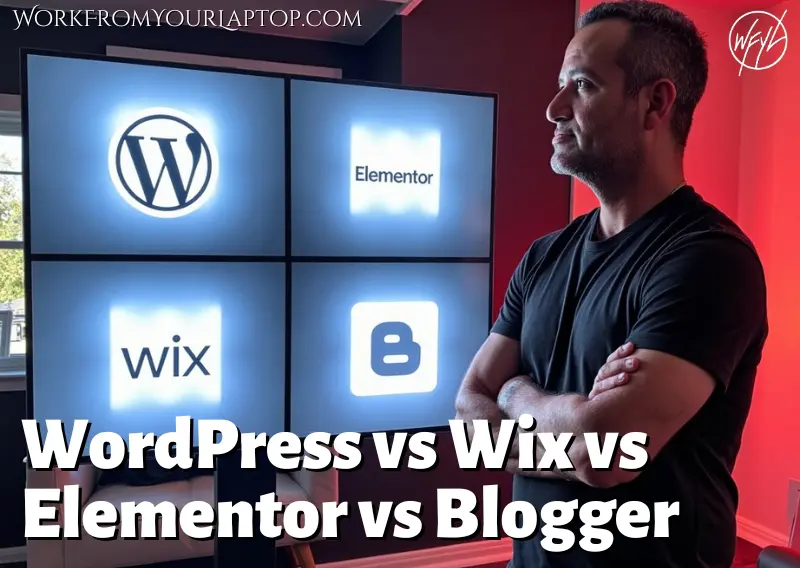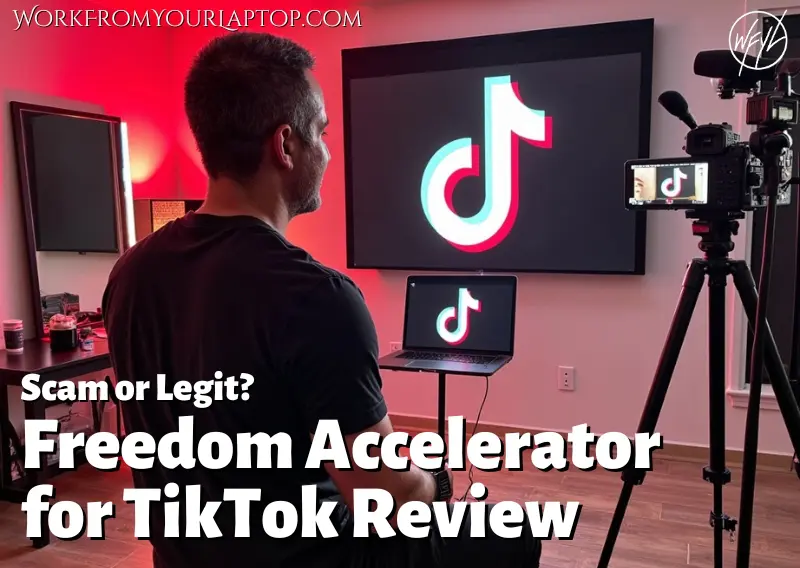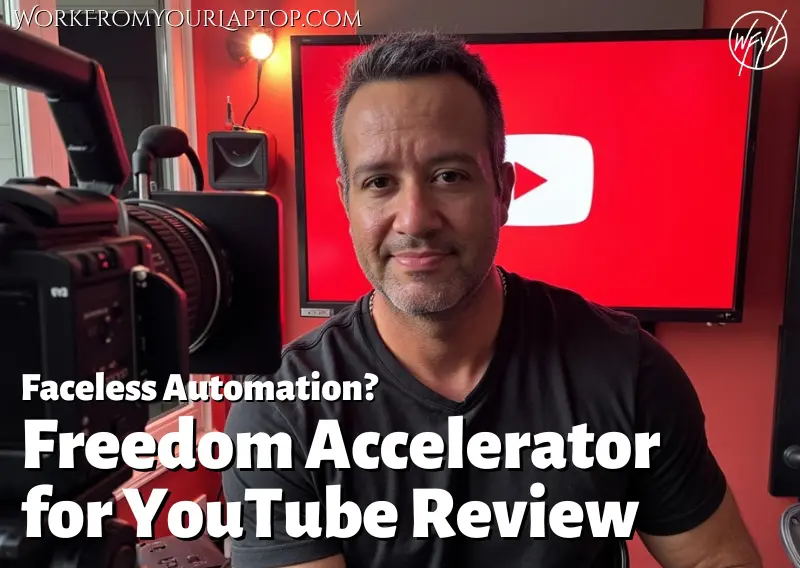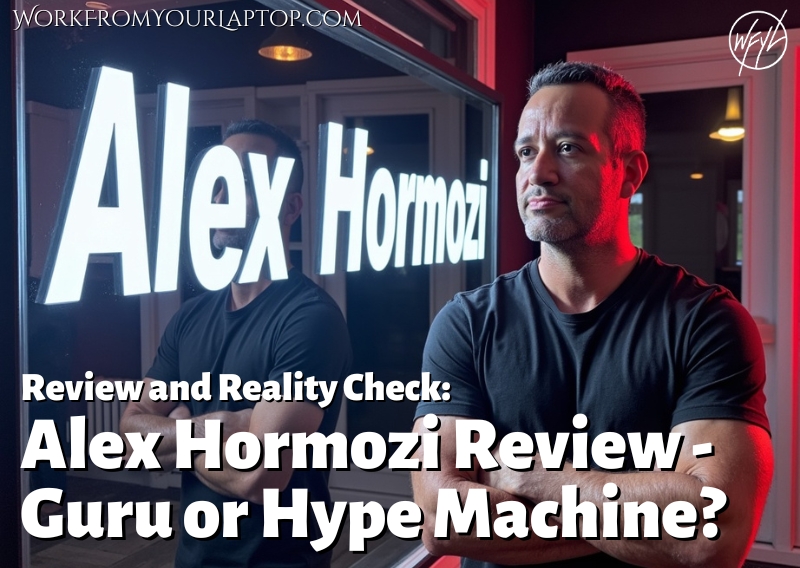Last updated on September 20, 2025 · In-depth guide, 5–7 min read

Starting a blog is simple, but picking the right tool can be tricky. WordPress gives control, Wix is easy, Blogger is basic, and Elementor helps make WordPress look better. It depends on your needs. Let’s compare some the pros and cons of each so you can see which option is best for you.
TL;DR: Which Blog Platform Should You Choose?
If you’re deciding between WordPress, Wix, Blogger, and Elementor, it comes down to control, cost, and ease. WordPress is most powerful, Wix is easiest, Blogger is simplest, and Elementor adds design to WordPress.
- WordPress = flexibility and growth. Best for serious bloggers, businesses, and anyone who wants full control over design, SEO, and scaling.
- Elementor = design power on WordPress. Adds drag-and-drop design to WordPress, making it more visual without sacrificing flexibility.
- Wix = simple, fast, all-in-one. Great for beginners who don’t want to mess with hosting or maintenance.
- Blogger = free and basic. Great for hobbyists or those testing blogging before committing.
- Control vs convenience trade-off. The more control you want (WordPress), the more setup/maintenance you handle. The less you want to think about it (Wix/Blogger), the fewer options you’ll have later.
What’s In This Article? (Quick Jumps)
- Features & Key Traits of Each Platform
- Ease of Use: How Beginner-Friendly Are They?
- Pros and Cons of Each Platform
- Direct Comparisons: Which One Wins in Different Scenarios
- Best Fit Recommendations for Different Types of Bloggers
- Final Thoughts
- FAQs
Features & Key Traits of Each Platform
Let’s start with the basics. Each of these has its own “core identity.”
WordPress (self-hosted, WordPress.org)
- Number one global website platform (over 40% of all websites are built on WordPress)
- Installed on a hosting service to build websites.
- Powers many sites because it’s flexible and can grow.
- Supports themes and plugins for almost any feature.
- Great for long-term blogs, though harder to learn.
- Can handle small blogs, big sites, or even online stores.
Elementor
- A WordPress plugin, not its own platform.
- Has many modern design features and uses drag-and-drop tools.
- Pro version adds advanced features and full site design.
- Popular with bloggers who want a polished look.
- Includes many ready-made templates.
Wix
- All-in-one website builder with hosting included.
- Start by signing up and picking a template.
- Drag-and-drop editing makes it beginner-friendly.
- Once you choose a design, big changes are harder.
- Works well for simple blogs or small business sites.
Blogger
- Google’s free blogging tool, very basic.
- Easy to start within minutes.
- Good for hobby blogs and casual writing.
- Limited design choices and growth potential.
- Often replaced by WordPress or Wix for more control.
Ease of Use: How Beginner-Friendly Are They?
Blogger is the easiest to use. You log in with your Google account, pick a template, and start writing right away. It’s very beginner-friendly, but you can’t change much about how it looks. If you want special designs or advanced tools, you’ll run into limits fast.
Wix is the next easiest. It uses drag-and-drop editing, so you can move things around on the page. You don’t have to worry about hosting or security. You can make a good-looking blog in one day, and it’s fun to use. But if you want advanced tools or try to switch templates later, it can be tricky.
WordPress takes a little more work. You need to buy hosting, set up a domain name, install WordPress, and pick a theme. Writing posts is easy, but you have to keep plugins updated and make sure your site stays secure.
For beginners, it might feel a little tough, but once you get the hang of it, you’ll have way more options and control than with Wix or Blogger.
Related article: Just how easy can it be to create a website on WordPress? Check out my guide and see how you can have your own WordPress website up in MINUTES!
Elementor used to feel like you were unlocking all of WordPress’s capabilities when you installed the plugin. But that was back when WordPress used the classic editor. Now that WordPress has upgraded to the block editor by default I feel there’s really no need to use Elementor.
The main reason is that Elementor isn’t very intuitive. It has a steep learning curve, but if you master it, you’ll be able to utilize some cool motion style graphics and more.
Related article: Will Updating Elementor Break My Website?
Pros and Cons of Each Platform
Alright, here’s where it gets interesting. Let’s break them down.
WordPress (self-hosted)
Pros:
- Maximum control over design, functionality, and hosting.
- Thousands of plugins and themes to customize almost anything.
- Strong SEO potential with plugins like Yoast or Rank Math.
- Scales easily from a tiny personal blog to a massive site.
- You own your content and can move hosts anytime.
- Block editor is a massive step up from the classic editor.
Cons:
- Higher learning curve than other platforms.
- Requires you to manage updates, backups, and security.
- Costs vary depending on hosting, themes, and plugins.
- Plugin or theme conflicts can cause headaches.
Elementor (on WordPress)
Pros:
- Drag-and-drop visual editing.
- Can customize headers, footers, and entire site layouts without using any code.
- Responsive design controls built-in.
- Lots of pre-made templates to get started quickly.
Cons:
- Adds complexity and potential performance issues if overused.
- High learning curve and not very intuitive
- Premium features require a paid plan.
- Still requires you to manage WordPress hosting and maintenance.
Wix
Pros:
- Very beginner-friendly, no technical setup needed.
- Hosting, security, and updates are all handled for you.
- Attractive templates and an easy visual editor.
- Built-in apps for SEO, eCommerce, and more.
- Quick setup for custom domains.
Cons:
- Less flexible than WordPress for advanced features.
- Templates are harder to switch later, so you often have to rebuild.
- SEO tools are improving but still more limited than WordPress.
- Migration away from Wix is difficult.
- Pricing climbs if you need advanced features.
Blogger
Pros:
- Completely free to use (except for custom domains if you want one).
- Extremely simple to set up and start posting.
- Integrated with Google services like AdSense and Analytics.
- Hosting and security handled by Google.
- Perfect for hobby or experimental blogs.
Cons:
- Very limited design options and customization.
- Few updates over the years, feels outdated.
- No real plugin ecosystem.
- Harder to scale or monetize seriously.
- Your blog lives on Google’s servers and you don’t have full ownership.
Direct Comparisons: Which One Wins in Different Scenarios
Let’s say you have different goals and want to know which platform fits best.
- If you just want to write without worrying about tech → Blogger is the easiest. It costs nothing and has no upkeep.
- If you want something simple but modern-looking → Wix works well. It’s easy to use, though you give up some control.
- If you want to grow your blog or maybe make money from it → WordPress is the best choice. Add Elementor if design is very important to you.
- If design is your top priority → WordPress with Elementor lets you build any look you want.
- If you need the cheapest option → Blogger or low-cost WordPress hosting is the winner.
Best Fit Recommendations for Different Types of Bloggers
- Hobbyist or journal-style blogger: Blogger. Free, quick, nothing to maintain.
- Beginner lifestyle or travel blogger: Wix. Attractive templates, easy to use, you can focus on writing and photos.
- Business owner who wants a blog: WordPress with Elementor. Looks professional, grows with you, integrates with ecommerce.
- Tech-savvy or long-term growth blogger: WordPress. It’s the most flexible and scalable choice.
- Design-focused creative blogger: Elementor on WordPress. The perfect mix of visuals and control.
Final Thoughts
The best platform depends on your needs. For ease, pick Blogger or Wix. For growth and flexibility, WordPress is stronger. Elementor helps by adding extra design functionality to WordPress. In my opinion, if you’re serious about building a website, use WordPress.
What Do You Think? Have you tried one of these platforms already, and did it live up to your expectations? Drop your thoughts in the comments below. Your experience might help someone else who’s stuck making the same choice.
Ready to stop chasing advice and build something that works?
I owe all my success to this training. Trust me, it’s worth taking a look.
🎯 Click here to check out my full review.
Frequently Asked Questions
Can I switch from Blogger to WordPress later?
Yes, you can export posts from Blogger and import them into WordPress. But you may lose formatting or need to fix broken links. Setting up redirects helps keep SEO intact.
Is Elementor its own blogging platform?
No, Elementor is a WordPress plugin. It doesn’t work on Wix or Blogger. It’s designed to give you drag-and-drop design power inside WordPress.
Is Wix or WordPress better for SEO?
WordPress generally has the edge because of plugins and fine-tuned control over structure, speed, and metadata. Wix has improved a lot though and works well for small to medium blogs.







Personally, I started with Blogger years ago (mostly because it was free and quick), then moved to WordPress once I realized I wanted more flexibility. It was a bit of a learning curve, but totally worth it once I got used to plugins and SEO tools. Do you think Elementor still has a strong place now that WordPress’s block editor has improved so much?
John
Back when all WordPress had was the antiquated Classic Editor, plugins like Elementor seemed like a massive UI leap as far as what could be done. Now with the block editor, I wouldn’t use Elementor at all. The block editor is much more intuitive and user friendly and since it’s the default there’s no extra plugin needed at all. It’s built into everything. Thanks for the comment!
time changes. things change too. Before landing on your article, I know about WordPress and WIX ( I hear about WIX because I see one of their paid advertisement ). To me, WordPress is the leader of the industry. Blogger acts like the classic while WIX is rising as the new generation.
how about the upcoming next year 2026? do you think WordPress will continue to maintain their position while AI technology is continuous learning and improving ?
WordPress will be the leader for the foreseeable future. It isn’t going anywhere. All my websites are built on WordPress. ???? Thanks for the comment!